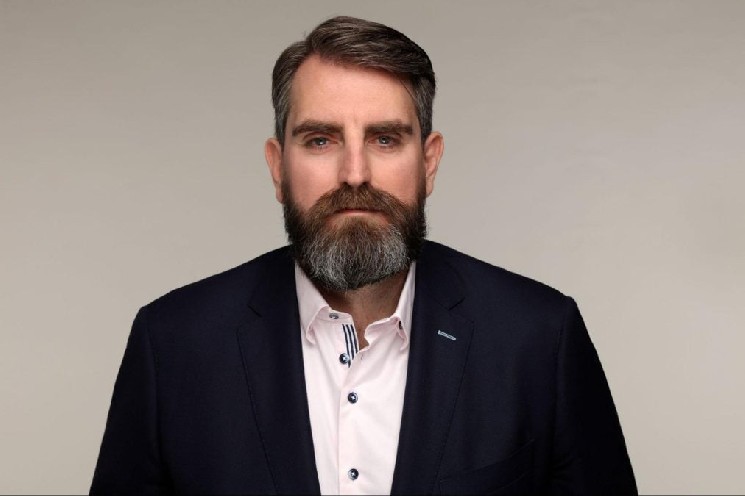As crypto exchanges reel, Kraken’s new UK head remains ‘extraordinarily bullish’

Barely a month into his new role, Blair Halliday was just finding his feet at crypto exchange Kraken when the spectacular collapse of rival FTX shook the industry to its foundations.
Kraken announced in October that Halliday had joined from Gemini, another exchange, to run its UK operations and expand in the region. Now, Halliday is also having to navigate a reckoning for centralized exchanges after FTX filed for Chapter 11 bankruptcy protection this month amid reports of billions in missing client funds.
“Regardless of the state of things as they currently are, joining Kraken was a terrific opportunity for me and remains one that I’m particularly proud and excited about,” Halliday said in an interview. “Whether you asked me this now or several weeks back, the song remains the same.”
“Whilst the industry is recoiling from the FTX collapse and the subsequent fallout from that, personally I remain extraordinarily bullish on two fronts. I am extraordinarily bullish about Kraken, Kraken remains [in] an extraordinarily strong position,” he added.
Show me the assets
Kraken is one of crypto’s oldest exchanges, having been founded in 2011. And Halliday — a crypto and financial services veteran who has worked in compliance roles at Circle and JPMorgan as well as spending 14 years at UK bank NatWest — is optimistic on its ability to shore up consumer confidence.
With crypto exchanges scrambling to produce proof-of-reserves audits in an effort to increase transparency, Halliday pointed out that Kraken was the first to introduce such an audit, back in 2014.
And earlier this year, Kraken announced that accounting firm Armanino would conduct semi-annual proof-of-reserve audits, enabling customers to prove their bitcoin and ether balances were backed by real assets. Kraken expanded the audit to several other crypto assets in August.
Armanino was reportedly responsible for auditing FTX’s 2021 financial results — although not its reserves.
Kraken’s most recent proof-of-reserves audit covered around 65% of assets, Halliday said. To further prop up client confidence, he said he wants to bring this closer to 100% in future.
No silver bullet
Proof of reserves has its challenges, however. It’s simply a snapshot of assets at a point in time, which creates opportunities for manipulation.
Reserves are just one facet of many interconnected financial metrics, said Wayne Trench, CEO of exchange OSL, in a recent interview with The Block. They don’t reveal audited fiat reserves, client and company liabilities, company loans and a lot of other information required to verify a firm’s financial health, he added.
Halliday concurred. “Proof of reserves isn’t the silver bullet. It’s part of the arsenal of ensuring that the consumers and institutions get additional comfort.”
Other components in the arsenal include having a strong customer service model and securing relevant regulatory approvals, Halliday said.
“Whilst there’s a lot to be done, we’re confident that we’re helping to show the way forward,” Halliday said.
A big part of Kraken’s plans and top of Halliday’s agenda is getting this message across to consumers through marketing and brand awareness with various roll outs planned for the coming weeks and into the new year.
“We’re not going to move enormously away from what we are as an institution, which is talking about the importance of security, talking about giving access to education and all that good stuff.”
Halliday was also excited to talk up Kraken’s presence in the UK, one its largest markets by trading volume.
“We have over 350 people here, it is a really important part of our plan to continue our growth,” Halliday said. “And we’re looking forward to introducing marketing, which no doubt some of that will have a UK play but also be about Kraken’s global mission and crypto.”
Keeping its own counsel
While Kraken could look to leverage FTX’s collapse to bolster growth through hiring or M&A deals, the exchange is keeping quiet for now.
Kraken is continuing to focus on key hires this year and into next, Halliday said. The company currently has over 3,400 employees across 75 countries.
“The desire and the willingness to invest remains there,” Halliday said. “And where we need those hires, we will absolutely do them and I’m looking forward to bringing more talented people into the crypto UK family.”
Likewise, the exchange is open to investing in growing its operations in Europe where there isn’t an existing presence, Halliday said.
“There might not necessarily have been a whole bunch of headline acquisitions, I think it would also be fair to say that we keep our counsel on that,” Halliday said. “And it’s not necessarily [something] we go public with, which is maybe in contrast to certain other firms.”






 Bitcoin
Bitcoin  Ethereum
Ethereum  Tether
Tether  USDC
USDC  TRON
TRON  Dogecoin
Dogecoin  Cardano
Cardano  Bitcoin Cash
Bitcoin Cash  Chainlink
Chainlink  Zcash
Zcash  Monero
Monero  LEO Token
LEO Token  Stellar
Stellar  Litecoin
Litecoin  Hedera
Hedera  Dai
Dai  Cronos
Cronos  Tether Gold
Tether Gold  OKB
OKB  Ethereum Classic
Ethereum Classic  KuCoin
KuCoin  Gate
Gate  Algorand
Algorand  Cosmos Hub
Cosmos Hub  VeChain
VeChain  Dash
Dash  Tezos
Tezos  TrueUSD
TrueUSD  Stacks
Stacks  IOTA
IOTA  Decred
Decred  Basic Attention
Basic Attention  Theta Network
Theta Network  NEO
NEO  Synthetix
Synthetix  Qtum
Qtum  Ravencoin
Ravencoin  DigiByte
DigiByte  0x Protocol
0x Protocol  Nano
Nano  Zilliqa
Zilliqa  Holo
Holo  Siacoin
Siacoin  Numeraire
Numeraire  Waves
Waves  Ontology
Ontology  Status
Status  BUSD
BUSD  Enjin Coin
Enjin Coin  Pax Dollar
Pax Dollar  Hive
Hive  Lisk
Lisk  Steem
Steem  Huobi
Huobi  OMG Network
OMG Network  NEM
NEM  Bitcoin Gold
Bitcoin Gold  Augur
Augur  HUSD
HUSD